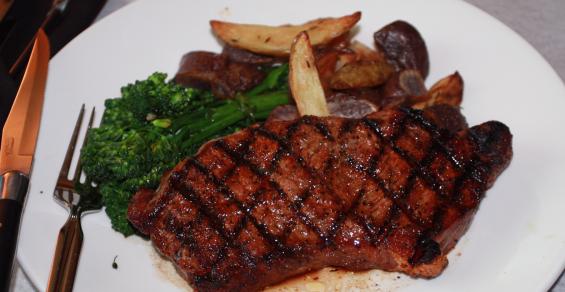When I was pregnant with my two kids, I continued to consume plenty of red meat in my diet. I was certain that plenty of animal proteins and fats would help me fight nausea in the first trimester by keeping my blood sugars level, alleviate symptoms of swelling and excessive weight gain, avoid gestational diabetes and foster a healthy environment by providing the proper building blocks for my babies to grow.
I was fortunate to have relatively easy pregnancies and blessed to have two healthy, happy infants. Of course, it’s all in God’s hands, but I do think that beef helped me to build my family in the best way possible.
READ: Do the best pregnancy diets center around red meat?
In previous blog posts, I’ve written about the benefits of red meat and pregnancy, but recently, a reader sent me a study featured on Medscape that revealed another surprising benefit to a pregnancy diet that is rich in red meat.
According to Deborah Brauser for Medscape, “Eating little or no red meat during pregnancy has been linked to substance use in offspring in new research findings. The cohort study of more than 5,000 adolescents showed that children of mothers who consumed less meat during pregnancy were at significantly greater risk for alcohol and tobacco use by the age of 15 years and were 2.5 times more likely to consume cannabis, compared to their counterparts whose mothers ate meat daily while pregnant.”
Skeptical about the connection? I was, too, but in his research, investigator Capt. Joseph R. Hibbeln, MD, acting chief of the Section on Nutritional Neurosciences at the National Institute on Alcohol Abuse and Alcoholism at the National Institutes of Health, discovered that there are certain interactions shown between the Transcobalamin 2 gene (TCN2) and meat consumption, or lack thereof, which caused cobalamin/vitamin B12 deficiencies.
READ: Is it safe to eat red meat during pregnancy?
“We thought that fish would protect the kids from substance use problems, but we were wrong. It was when mothers ate more red meat,” said Hibbeln, in an interview with Medscape Medical News. “That protected the children when they were teenagers in a dose-response pattern for substance use, which was surprising. And we were able to validate that using a technique of looking at variants in the transporter for vitamin B12.”
The researchers discovered that a vegetarian diet tends to result in the “avoidance of nutrient-dense meats, which can decrease intake of cobalamin, iron, omega-3 fatty acids, selenium, and zinc, particularly in young women of childbearing age.”
A meatless diet in turn can cause inadvertent nutritional deficiencies during pregnancy, which could result in “residual neurodevelopment harm to offspring,” says the study.
So how did researchers come to this conclusion? They enrolled 14,541 pregnant women who were due with their babies in 1992 for an ongoing study, including a food frequency questionnaire. Additionally, TCN2 genotyping was conducted, and biomarkers of iron status were measured. Once the children were 15 years old, researchers assessed 5,109 of the offspring at a clinic visit where they asked the kids via electronic questionnaire about current substance use.
According to the authors, “Results showed no significant associations between the three substance use outcomes (alcohol, tobacco, and cannabis use) and traditional, processed, or confectionary maternal dietary patterns. However, vegetarianism was associated with all three adverse outcomes. The risks were greater specifically for low prenatal meat consumption, which included consumption of red meat, poultry, and meat products combined.
“Lower meat consumption disproportionally increased the risks of offspring substance misuse among mothers with optimally functional (homozygous) variants of the TCN2 gene.”
However, Hibbeln did note that this is an association study, which does not necessarily show causation, but he does say it would be prudent for pregnant women to make sure they are getting enough B12 in their diets, through food or supplements.
To read more about the study, click here.
The opinions of Amanda Radke are not necessarily those of beefmagazine.com or Farm Progress.




Leave A Comment